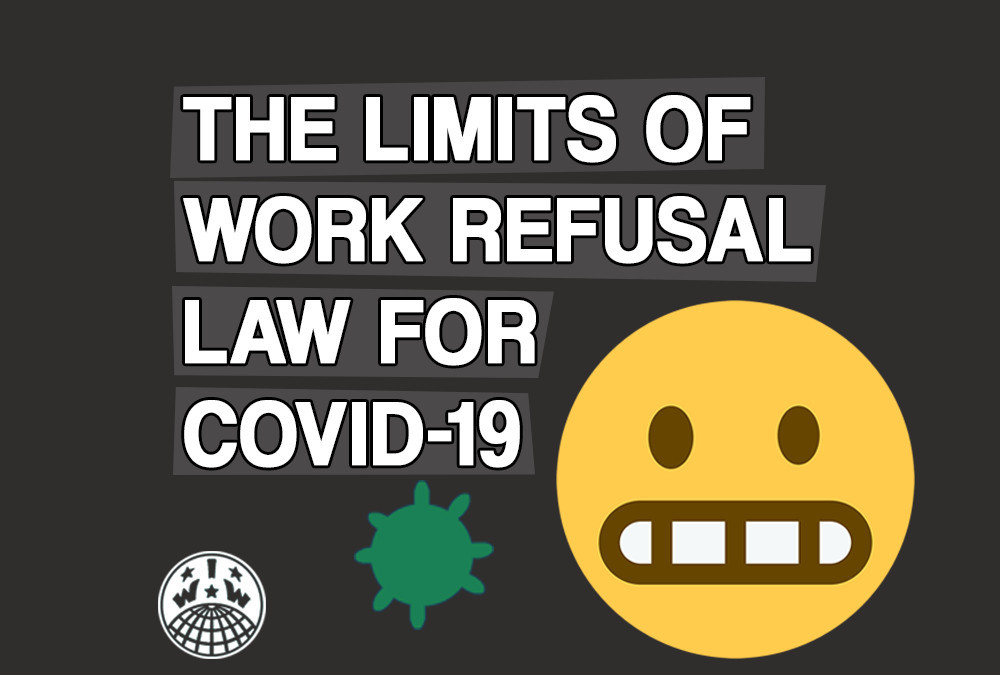We have seen lots of people talking online about work refusal and how the law appears to support it. Some of us in the IWW are concerned that this law is being presented in a reckless way; workers are not being warned as to how bosses will respond, the stress and length of the tribunal process, and the unlikelihood of meaningful victory at the end.
The purpose of this article is to inoculate you (excuse the pun) to the challenges that you will face if you go down this route.
In short, work refusal on the grounds of ERA 1996 should be treated as the absolute last resort, if all else fails. Do not go for it without advice from your union!
1) Employment Rights Act 1996.
Individual workers have the legal right to refuse work upon certain conditions, as set out in the Employment Rights Act 1996, section 44. A worker should not face any “detriment” by an employer on the grounds that:
e) in circumstances of danger which the employee reasonably believed to be serious and imminent and which he could not reasonably have been expected to avert, he left (or proposed to leave) or (while the danger persisted) refused to return to his place of work or any dangerous part of his place of work, or
d) in circumstances of danger which the employee reasonably believed to be serious and imminent, he took (or proposed to take) appropriate steps to protect himself or other persons from the danger.
Workers could have legal grounds to refuse to go back to work if they think coronavirus poses a “serious and imminent” danger to themselves or others, including family members or customers.
2) However…
Crap bosses don’t care about the law.
The law is weak protection for workers because bosses break it all the time! Even though you are not meant to face any “detriment,” it is pretty likely you will anyway! Especially with regards to small businesses, where bosses are not supported by big HR departments or teams of lawyers, they might sack you, withhold wages, make you redundant, or pull any kind of childish nonsense.
The law hasn’t been tested for Covid-19!
These problems are resolved by an Employment Tribunal, which is a bit like a court for workers and employers. There are only three cases that have been won on the grounds of Section 44 ERA 1996, and they were in extremely shocking situations. There is not yet any precedence for this law relating to coronavirus because it has not been tried. We are not claiming that coronavirus does not constitute a “serious or imminent danger,” but just that we simply do not know for certain how tribunals will treat it.
Nevertheless…
…We think workers are pretty unlikely to win.
While we do not know for sure, we are very sceptical about how successful workers will be when using this law in relation to coronavirus. We think that if the boss has put even the most cursory measures in place they will probably not lose a tribunal case on this. They can say they have extra cleaning, hygiene procedures, signposting, social distancing, PPE – whether that is true or not might not even make a difference. In most cases the tribunal will not rule against them.
Tribunal cases are stressful and take ages.
These cases can take a very long time to resolve; it is not unusual for tribunal cases to take a year to complete. Making matters worse is that coronavirus is causing hold-ups and creating a backlog. So if you get sacked for refusing to work and want to challenge via tribunal, you could be looking at an extremely long time for a result that, as we have said, probably will not be satisfactory.
It is a tough route to build workers power.
What we can do as a union and what you can do as a team of workers is limited if you go down the legal route. The ERA 1996 legislation is an individual remedy to a problem that involves all of you. It is an individual right to refuse work, not a collective right – if it was presented as such it would be viewed as an illegal industrial action. If you and your colleagues decide to use this legislation you have to do so very carefully; i.e. as individuals who just-so-happen to simultaneously exercise your individual rights under Section 44 ERA 1996.
3) When should you go down the work refusal route?
Workers who are in the unfortunate situation where their workplace is inherently dangerous have a very difficult decision to make. Is the health of yourself and your household put at such a risk that refusing to go to work is necessary? Or, is your concern about health risk such that you are willing to risk losing your job?
Obviously the IWW will proactively support you in any decision that you make. But we cannot guarantee that you will not face disciplinary action nor that you will not lose your job. We cannot even guarantee that a tribunal would rule in your favour regarding unfair dismissal, and even if they do the outcome is unlikely to be satisfactory.
Ultimately, we do not think that the power of the working class comes from laws made by millionaire landlords in Westminster, Holyrood, Stormont, or the Senedd. Our power comes from the very basic fact that we produce the world, we keep everything running, and when we learn how to organise that power for our own interests we become a force to be reckoned with!
How do we do that? Check out this piece for a good start!
